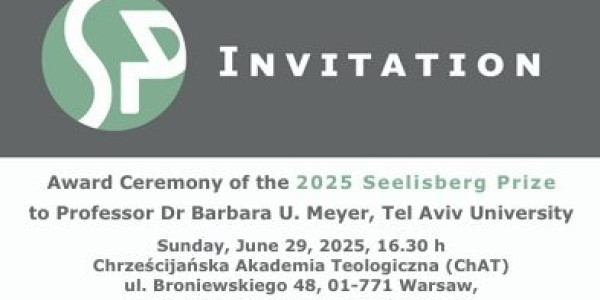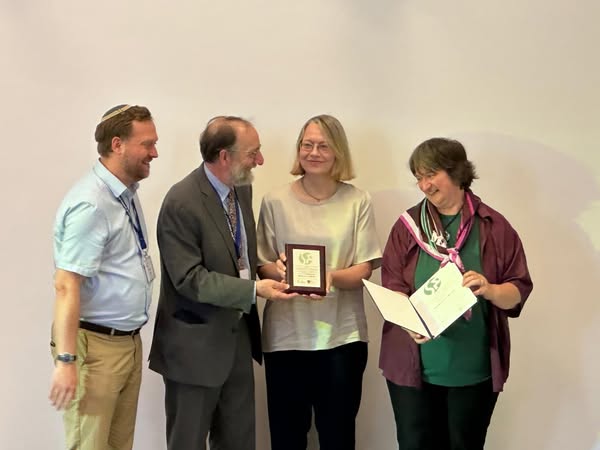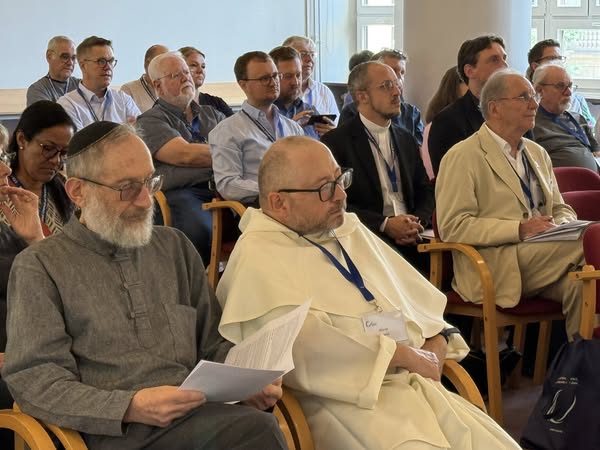Seelisberg Prize 2025 Profesor Dr Barbarze U. Meyer, z Uniwersytetu w Tel Awiwie
29/06/2025 | Na stronie od 06/06/2025

W imieniu Światowej Rady Chrześcijan i Żydów (ICCJ) oraz Polskiej Rady Chrześcijan i Żydów, serdecznie zapraszamy na uroczystą ceremonię wręczenia
Seelisberg Prize 2025 Profesor Dr Barbarze U. Meyer, z Uniwersytetu w Tel Awiwie.
s. dr Katarzyna Kowalska NDS
Współprzewodnicząca Polskiej Rady Chrześcijan i Żydów
Vice - President of the International Council of Christian and Jews
prof. Stanisław Krajewski
Wpółprzewodniczący Polskiej Rady Chrześcijan i Żydów
More:
Meyer Barbara U.
Dr. Barbara U. Meyer is senior lecturer at the program for Religious Studies at Tel Aviv University. Her main fields of research are contemporary Christology, concepts of evil in Jewish and Christian thought, and theologies of law in interreligious relations.
She is the author of Christologie im Schatten der Shoah – im Lichte Israels. Studien zu Paul van Buren und Friedrich-Wilhelm Marquardt (TVZ 2004, English translation forthcoming), and other articles on interreligious theology, law in Christian post-Shoah thought and the Jewish identity of Jesus, such as "The Dogmatic Significance of Christ being Jewish", in: Christ Jesus and the Jewish People Today: New Explorations of Theological Interrelationships, ed. by Philip A. Cunningham et al. (Eerdmans 2011) and "Walking the Way of the Star: Paul Van Buren", in: Faith, Truth and Reason. New Perspectives on Franz Rosenzweig's Star of Redemption", ed. by Yehoyada Amir et al. (2012).
Dr. Meyer looks at contemporary Christian thought with both an ecumenical and interreligious approach. She examines the changes in Christian understandings of Judaism as well as current dynamics of Christian self-understanding going back to its original Jewish context.
- The Jewish Jesus in Christian and in Jewish memory Meyer, B. U., 2025, The New Cambridge Companion to Jesus. Bockmuehl, M. (ed.). Cambridge: Cambridge University Press, p. 283-298 16 p. (Cambridge Companions to Religion).
- Not Just the Time of the Other. What Does It Mean for Christians Today to Remember Shabbat and Keep It Holy? 01.09.2022, Article.
- Jesus the Jew in Christian Memory: Theological and Philosophical Explorations Meyer, B. U., 2020, Cambridge, United Kingdom; New York, NY, USA: Cambridge University Press. 212 p.
- מחשבות יהודיות, אוניברסליות ונוצריות על סבל ועל שואה מאייר, ב. & רותם, א. (Translator), 2020, עיוני תרבות: התחדשות החיים היהודיים במשנתו של אליעזר שביד. עמיר, י. & טרנר, י. (eds.). ירושלים: כרמל, Vol. א'. p. 329-341 13 p. (פרשנות ותרבות: סדרה חדשה)
- זיכרון ומוסר: האתגר לנצרות /..../
SEELISBERG PRIZE
The SEELISBERG PRIZE is named in memory of the ground-breaking gathering that occurred in the small Swiss village of Seelisberg from 30 July to 5 August 1947 to address perennial Christian teachings of contempt for Jews and Judaism. It issued the very influential "A Call to the Churches: The Ten Points of Seelisberg" which is widely recognized as inaugurating the transformation in relations between Jews and Christians that has unfolded over the past seventy years
The SEELISBERG PRIZE is awarded annually (since 2022) by the International Council of Christians and Jews (which originated out of the Seelisberg conference) and the Center for Intercultural Theology and Religions at the University of Salzburg. It honours individuals who have played major roles through their scholarship and teaching in advancing the rapprochement between Jews and Christians.
- Nagroda Seelisberg – upamiętniająca przełomową konferencję w Seelisbergu w 1947 r. – przyznawana jest przez ICCJ wspólnie z Centrum Teologii Międzykulturowej i Religii Uniwersytetu w Salzbourgu osobistościom, które poprzez swoją działalność badawczą i dydaktyczną w znaczący sposób przyczyniają się do zbliżenia pomiędzy chrześcijanami i Żydami.
- Major project on Jewish-Christian dialogue launched at the PLUS
- SEELISBERG PRIZE 2024: Edward Kessler to be Awarded 2024 SEELISBERG PRIZE 23/06/2024
- Seelisberg Prize 2023 to Joseph Sievers
- Prof. Amy-Jill Levine awarded first “Seelisberg Prize” (2022) by the ICCJ and the University of Salzburg
ICCJ
- International Council of Christians and Jews (ICCJ)
- Międzynarodowa Rada Chrześcijan i Żydów ICCJ
- Międzynarodowa Rada Chrześcijan i Żydów (ICCJ) - Kronika
- Seelisberg 1947 (30 VII - 5 VIII)
- ICCJ - konferencje doroczne od 1947
- Konferencja Międzynarodowej Rady Chrześcijan i Żydów (ICCJ) Salzburg 2024 (Raport)
- ICCJ 2024 Conference in Salzburg / Austria
CRIS: Center for Religious and Interreligious Studies at Tel Aviv University
Nature and Aims
The Center for Religious and Interreligious Studies at Tel Aviv University is founded on the idea that due to their revelational and theological entanglement, the three so-called Abrahamic faiths have developed since the inception of Christianity in fertile and fervid interaction. So much so that it is impossible to properly understand any significant moment in the life of any one of the three, without taking into serious account the real and imagined, conscious and unconscious give and take between the community under study and the other two. The Center is dedicated, therefore, to studying and teaching the three faiths interreligiously, rather than merely comparatively, as the developing outcomes of an intense, dynamic and complex process of interreligious interaction on all levels of religious life: exegetical, social, practical, liturgical, institutional, artistic, and theological.
The three religions are hence studied and taught at the Center side by side by experts in each of the main facets of each faith tradition, collaborating closely with one another both within their religions of expertise, and across the three interreligious divides. Such an undertaking requires an integrated effort involving the full range of the human and social sciences. And given its sheer scope and complexity, no university can hope to accomplish it alone.
The Center aims, therefore, at forging and promoting firm academic collaborations with like-minded research institutions world-wide. The first agreement of this kind was signed in 2010 with the University of Cambridge, where the Cambridge University Project for Religion in the Humanities (CUPRiH) was established for this purpose. CRIS and CUPRiH have since collaborated closely in organizing several workshops, symposia and full-fledged conferences at Tel Aviv and Cambridge devoted to the interreligious study of the three religions. A similar joining of forces is in the making with a group of senior researchers at the Goethe University, Frankfurt.
It is our sincere hope that in redirecting the study of religion from the well-honed methods of comparative religion toward a more dynamic and dialogical approach, we shall be achieving more than a viable and timely academic objective. For to study and teach the three religions interreligiously, is to direct constant attention to the formative role each of them played in the lives of the other two. This bears the promise, not only of dispelling their all too often degrading and demonizing misrepresentations of one another, but, more significantly, of conveying a deep sense of their religious interdependence and value to one another; of how very differently they might have developed lacking the constant challenge they posed each other.
The Center comprises three main components that mirror its three main objectives:
- An adequately staffed and funded research institute dedicated to promoting cutting-edge research in groups of senior and junior researchers collaborating in all areas of interreligious studies, theoretical and historical. For details of the Center’s seminars, international workshops, colloquia, and bi-annual international conferences past and present, click here. It is our intention to join forces with our partners abroad in founding both a journal and monograph series devoted the dialogical approach to interreligious dynamics.
- A graduate study program that will offer an elite research-track MA in interreligious studies, a related teacher-training programs, and a variety of course offerings. A percentage of the Center’s courses will be taught in English to encourage students from abroad.
- A unit for interreligious dialogue and understanding devoted to hosting religious leaders, educators and clerics of the three Abrahamic religions at the Center, and allowing them the opportunity to study and deliberate with its faculty and with each other on religiously significant topics of timely interest and urgency in the spirit of the Center’s dialogical approach. To this end, the Center will seek to cooperate with similar centers and forums of interreligious of learning, such as the Shalom Hartman Theology Conference, and various forums of Scriptural Reasoning.
Material added after the ceremony

Ceremony of Seelisberg Award 2025 for prof dr Barbara Meyer.

We begun with a meditation by rabbi Shmuel, followed by an input about Polska Rada Chrześcijan i Żydów and history of J-Ch relations in Poland . Finally our well developing networks/platforms were presented : International Abrahamic Forum , Theological Commiter and Early Career Network . Thank you Centrum Luteranskie for hosting us !